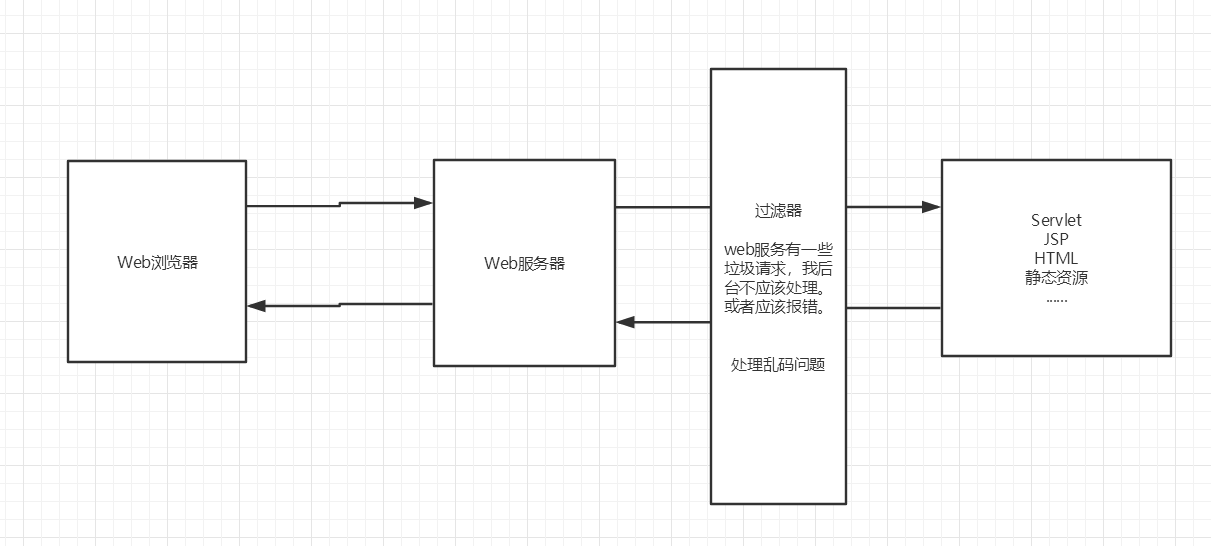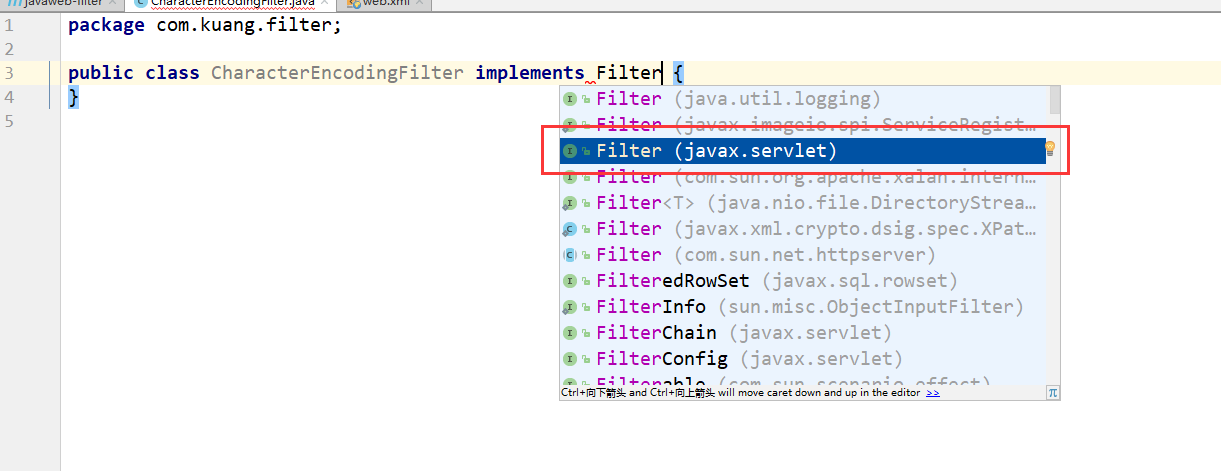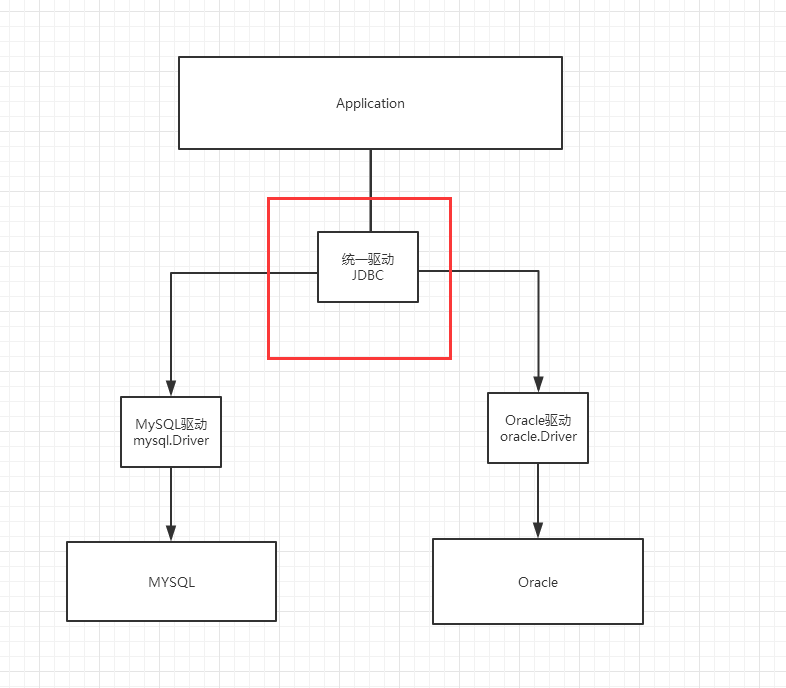11、Filter (重点)
Filter:过滤器 ,用来过滤网站的数据;
- 处理中文乱码
- 登录验证….

Filter开发步骤:
-
导包
-
编写过滤器
- 导包不要错

实现Filter接口,重写对应的方法即可
```java
public class CharacterEncodingFilter implements Filter {
//初始化:web服务器启动,就以及初始化了,随时等待过滤对象出现!
public void init(FilterConfig filterConfig) throws ServletException {
System.out.println("CharacterEncodingFilter初始化");
}
//Chain : 链
/*
1. 过滤中的所有代码,在过滤特定请求的时候都会执行
2. 必须要让过滤器继续同行
chain.doFilter(request,response);
*/
public void doFilter(ServletRequest request, ServletResponse response, FilterChain chain) throws IOException, ServletException {
request.setCharacterEncoding("utf-8");
response.setCharacterEncoding("utf-8");
response.setContentType("text/html;charset=UTF-8");
System.out.println("CharacterEncodingFilter执行前....");
chain.doFilter(request,response); //让我们的请求继续走,如果不写,程序到这里就被拦截停止!
System.out.println("CharacterEncodingFilter执行后....");
}
//销毁:web服务器关闭的时候,过滤会销毁
public void destroy() {
System.out.println("CharacterEncodingFilter销毁");
}
}
```
-
在web.xml中配置 Filter
<filter> <filter-name>CharacterEncodingFilter</filter-name> <filter-class>com.kuang.filter.CharacterEncodingFilter</filter-class> </filter> <filter-mapping> <filter-name>CharacterEncodingFilter</filter-name> <!--只要是 /servlet的任何请求,会经过这个过滤器--> <url-pattern>/servlet/*</url-pattern> <!--<url-pattern>/*</url-pattern>--> </filter-mapping>
12、监听器
实现一个监听器的接口;(有N种)
-
编写一个监听器
实现监听器的接口…
//统计网站在线人数 : 统计session public class OnlineCountListener implements HttpSessionListener { //创建session监听: 看你的一举一动 //一旦创建Session就会触发一次这个事件! public void sessionCreated(HttpSessionEvent se) { ServletContext ctx = se.getSession().getServletContext(); System.out.println(se.getSession().getId()); Integer onlineCount = (Integer) ctx.getAttribute("OnlineCount"); if (onlineCount==null){ onlineCount = new Integer(1); }else { int count = onlineCount.intValue(); onlineCount = new Integer(count+1); } ctx.setAttribute("OnlineCount",onlineCount); } //销毁session监听 //一旦销毁Session就会触发一次这个事件! public void sessionDestroyed(HttpSessionEvent se) { ServletContext ctx = se.getSession().getServletContext(); Integer onlineCount = (Integer) ctx.getAttribute("OnlineCount"); if (onlineCount==null){ onlineCount = new Integer(0); }else { int count = onlineCount.intValue(); onlineCount = new Integer(count-1); } ctx.setAttribute("OnlineCount",onlineCount); } /* Session销毁: 1. 手动销毁 getSession().invalidate(); 2. 自动销毁 */ } -
web.xml中注册监听器
<!--注册监听器--> <listener> <listener-class>com.kuang.listener.OnlineCountListener</listener-class> </listener> -
看情况是否使用!
13、过滤器、监听器常见应用
监听器:GUI编程中经常使用;
public class TestPanel {
public static void main(String[] args) {
Frame frame = new Frame("中秋节快乐"); //新建一个窗体
Panel panel = new Panel(null); //面板
frame.setLayout(null); //设置窗体的布局
frame.setBounds(300,300,500,500);
frame.setBackground(new Color(0,0,255)); //设置背景颜色
panel.setBounds(50,50,300,300);
panel.setBackground(new Color(0,255,0)); //设置背景颜色
frame.add(panel);
frame.setVisible(true);
//监听事件,监听关闭事件
frame.addWindowListener(new WindowAdapter() {
@Override
public void windowClosing(WindowEvent e) {
super.windowClosing(e);
}
});
}
}
用户登录之后才能进入主页!用户注销后就不能进入主页了!
-
用户登录之后,向Sesison中放入用户的数据
-
进入主页的时候要判断用户是否已经登录;要求:在过滤器中实现!
HttpServletRequest request = (HttpServletRequest) req; HttpServletResponse response = (HttpServletResponse) resp; if (request.getSession().getAttribute(Constant.USER_SESSION)==null){ response.sendRedirect("/error.jsp"); } chain.doFilter(request,response);
14、JDBC
什么是JDBC : Java连接数据库!

需要jar包的支持:
- java.sql
- javax.sql
- mysql-conneter-java… 连接驱动(必须要导入)
实验环境搭建
CREATE TABLE users(
id INT PRIMARY KEY,
`name` VARCHAR(40),
`password` VARCHAR(40),
email VARCHAR(60),
birthday DATE
);
INSERT INTO users(id,`name`,`password`,email,birthday)
VALUES(1,'张三','123456','zs@qq.com','2000-01-01');
INSERT INTO users(id,`name`,`password`,email,birthday)
VALUES(2,'李四','123456','ls@qq.com','2000-01-01');
INSERT INTO users(id,`name`,`password`,email,birthday)
VALUES(3,'王五','123456','ww@qq.com','2000-01-01');
SELECT * FROM users;
导入数据库依赖
<!--mysql的驱动-->
<dependency>
<groupId>mysql</groupId>
<artifactId>mysql-connector-java</artifactId>
<version>5.1.47</version>
</dependency>
IDEA中连接数据库:

JDBC 固定步骤:
- 加载驱动
- 连接数据库,代表数据库
- 向数据库发送SQL的对象Statement : CRUD
- 编写SQL (根据业务,不同的SQL)
- 执行SQL
- 关闭连接
public class TestJdbc {
public static void main(String[] args) throws ClassNotFoundException, SQLException {
//配置信息
//useUnicode=true&characterEncoding=utf-8 解决中文乱码
String url="jdbc:mysql://localhost:3306/jdbc?useUnicode=true&characterEncoding=utf-8";
String username = "root";
String password = "123456";
//1.加载驱动
Class.forName("com.mysql.jdbc.Driver");
//2.连接数据库,代表数据库
Connection connection = DriverManager.getConnection(url, username, password);
//3.向数据库发送SQL的对象Statement,PreparedStatement : CRUD
Statement statement = connection.createStatement();
//4.编写SQL
String sql = "select * from users";
//5.执行查询SQL,返回一个 ResultSet : 结果集
ResultSet rs = statement.executeQuery(sql);
while (rs.next()){
System.out.println("id="+rs.getObject("id"));
System.out.println("name="+rs.getObject("name"));
System.out.println("password="+rs.getObject("password"));
System.out.println("email="+rs.getObject("email"));
System.out.println("birthday="+rs.getObject("birthday"));
}
//6.关闭连接,释放资源(一定要做) 先开后关
rs.close();
statement.close();
connection.close();
}
}
预编译SQL
public class TestJDBC2 {
public static void main(String[] args) throws Exception {
//配置信息
//useUnicode=true&characterEncoding=utf-8 解决中文乱码
String url="jdbc:mysql://localhost:3306/jdbc?useUnicode=true&characterEncoding=utf-8";
String username = "root";
String password = "123456";
//1.加载驱动
Class.forName("com.mysql.jdbc.Driver");
//2.连接数据库,代表数据库
Connection connection = DriverManager.getConnection(url, username, password);
//3.编写SQL
String sql = "insert into users(id, name, password, email, birthday) values (?,?,?,?,?);";
//4.预编译
PreparedStatement preparedStatement = connection.prepareStatement(sql);
preparedStatement.setInt(1,2);//给第一个占位符? 的值赋值为1;
preparedStatement.setString(2,"狂神说Java");//给第二个占位符? 的值赋值为狂神说Java;
preparedStatement.setString(3,"123456");//给第三个占位符? 的值赋值为123456;
preparedStatement.setString(4,"24736743@qq.com");//给第四个占位符? 的值赋值为1;
preparedStatement.setDate(5,new Date(new java.util.Date().getTime()));//给第五个占位符? 的值赋值为new Date(new java.util.Date().getTime());
//5.执行SQL
int i = preparedStatement.executeUpdate();
if (i>0){
System.out.println("插入成功@");
}
//6.关闭连接,释放资源(一定要做) 先开后关
preparedStatement.close();
connection.close();
}
}
事务
要么都成功,要么都失败!
ACID原则:保证数据的安全。
开启事务
事务提交 commit()
事务回滚 rollback()
关闭事务
转账:
A:1000
B:1000
A(900) --100--> B(1100)
Junit单元测试
依赖
<!--单元测试-->
<dependency>
<groupId>junit</groupId>
<artifactId>junit</artifactId>
<version>4.12</version>
</dependency>
简单使用
@Test注解只有在方法上有效,只要加了这个注解的方法,就可以直接运行!
@Test
public void test(){
System.out.println("Hello");
}

失败的时候是红色:

搭建一个环境
CREATE TABLE account(
id INT PRIMARY KEY AUTO_INCREMENT,
`name` VARCHAR(40),
money FLOAT
);
INSERT INTO account(`name`,money) VALUES('A',1000);
INSERT INTO account(`name`,money) VALUES('B',1000);
INSERT INTO account(`name`,money) VALUES('C',1000);
@Test
public void test() {
//配置信息
//useUnicode=true&characterEncoding=utf-8 解决中文乱码
String url="jdbc:mysql://localhost:3306/jdbc?useUnicode=true&characterEncoding=utf-8";
String username = "root";
String password = "123456";
Connection connection = null;
//1.加载驱动
try {
Class.forName("com.mysql.jdbc.Driver");
//2.连接数据库,代表数据库
connection = DriverManager.getConnection(url, username, password);
//3.通知数据库开启事务,false 开启
connection.setAutoCommit(false);
String sql = "update account set money = money-100 where name = 'A'";
connection.prepareStatement(sql).executeUpdate();
//制造错误
//int i = 1/0;
String sql2 = "update account set money = money+100 where name = 'B'";
connection.prepareStatement(sql2).executeUpdate();
connection.commit();//以上两条SQL都执行成功了,就提交事务!
System.out.println("success");
} catch (Exception e) {
try {
//如果出现异常,就通知数据库回滚事务
connection.rollback();
} catch (SQLException e1) {
e1.printStackTrace();
}
e.printStackTrace();
}finally {
try {
connection.close();
} catch (SQLException e) {
e.printStackTrace();
}
}
}